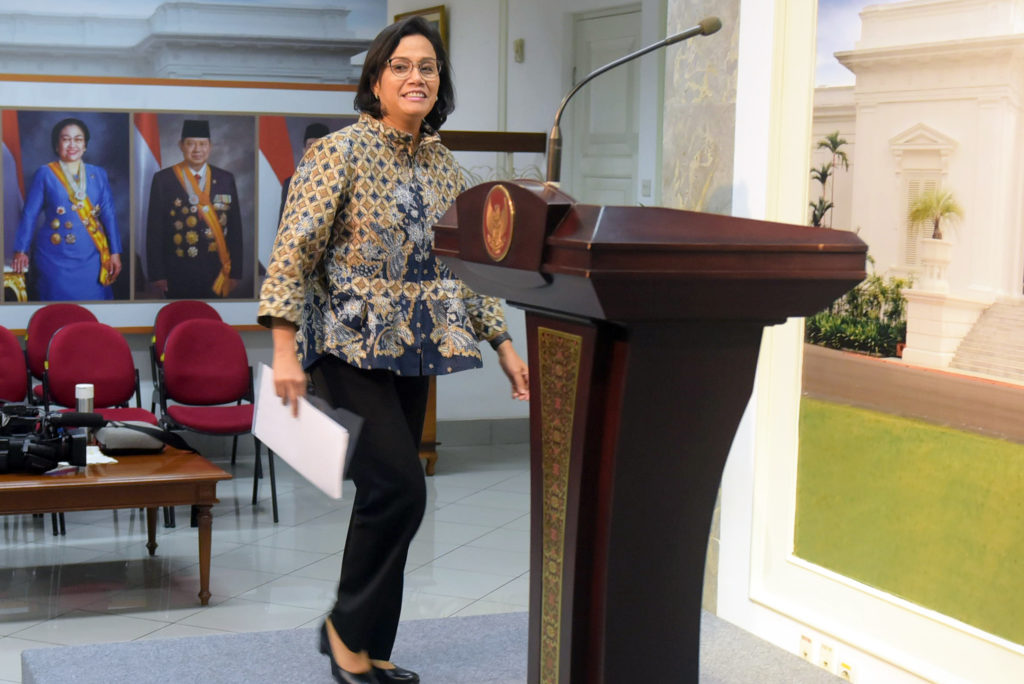Gov’t to Prepare Bill on Taxation

Minister of Finance Sri Mulyani Indrawati prepares to deliver press statement after a Limited Meeting at the Presidential Office, Jakarta, Tuesday (3/9). (Photo: Rahmat/PR)
The Government is preparing a Bill (RUU) on provisions and taxation facilities to strengthen the economy, which includes various important substances.
“This Bill aims to improve the economy of Indonesia by increasing investment funding, adjusting the principle of taxation income for individual taxpayers, using territorial principles, encouraging taxpayer compliance voluntarily, creating justice in the domestic business climate, and placing various tax facilities in one legislation,” said Minister of Finance Sri Mulyani Indrawati after attending a Limited Meeting at the Presidential Office, Jakarta, Tuesday (3/9).
Some important points from this Bill are as follows:
First, provisions related to income tax rates. This Bill will later affect three laws namely the Income Tax (PPh), the Value Added Tax (VAT), and the General Taxation Provisions.
“In terms of the Income Tax, the most important point in this Bill is the reduction in corporate PPh tariffs, from 25% to 20%,” the Minister explained.
The Government, she continued, will also provide a tax reduction for companies that go public under the PPh tariff to be cut by 3%, so if the company reaches 20%, it can be cut to 17%.
“This also applies in Singapore where new public companies get similar incentives. We give them 3% lower than the normal tariff for 5 years,” Sri added.
Second, revocation of the PPh on dividend from Indonesian and foreign companies. According to Sri, dividend from Indonesian and foreign companies with share of more than 25% are not subject to the PPh. However, if they have a share below 25%, they will be subject to normal PPh of 25%, while individual taxpayers are also subject to a final 10% PPh.
“In this Bill, we will revoke all PPh for dividend if it is invested in Indonesia,” said the Minister.
Third, provisions related to PPh for individual taxpayers. According to Sri, the Government will change the taxation scheme from worldwide to territorial. This means that both Indonesian citizens and foreigners will become taxpayers in Indonesia depending on how long they stay in Indonesia, with limitation of 183 days, and the subject of the tax will be subject to the territorial tax scheme.
Fourth, this Bill is designed for taxpayers to be more comply in easy ways. So, this Bill is designed to ease the taxpayers by reducing sanctions.
“For example, if taxpayers make corrections on the tax returns due to underpaid, usually, they are subject to a sanction of 2% per month from the underpaid tax. Meanwhile in this Bill, we reduce the sanction per month pro-rata based on the benchmark interest rate + (plus) 5%,” Sri explained, adding that the sanction depends on how long the taxpayer is underpaid. For example, if it is only 2 months then the calculation is 2 months per 12 times the market interest rate +5%.
In addition, the Government will also reduce financial penalties for tax invoices that are not made or that are not made on time. The sanction is 2% of the tax, while in this Bill, the sanction will be reduced to 1%.
Fifth, the Government will also relax the right to credit the input tax. “The credit means the company can request to reduce payment of their tax obligations,” Sri said.
Sixth, the Government will put all tax incentive facilities in one section, such as tax holiday, super deduction, PPh facilities for special economic zones, and PPh for national securities in the international market, Sri added.
Seventh, to anticipate the rising popularity of international digital companies such as Amazon, Google, and others, the Government will stipulate the companies to collect, deposit and report the VAT.
“This aims to avoid tax evasion of international companies from their VAT obligations. The VAT is 10%,” Sri explained.
Eighth, she continued, provisions on digital economy companies. Based on agreement of the last G20 meeting which has been carried out by the OECD (Organization for Economic Cooperation and Development) member countries, the so-called permanent business entity means the entity that has a physical presence.
“So, the company must exist in the territory of Indonesia, then they can be given a permanent establishment,” explained the Minister. In the meantime, this Bill stated that the definition of business entity is no longer based on physical presence. Therefore, even though they don’t have a branch office in Indonesia, the tax obligations still exist, Sri added.
“This is because they have significant economic activities even though they do not have branch offices here,” Sri said. (FID / MAY / RAH / ES)
Translated by: Estu Widyamurti
Edited by: Mia Medyana








